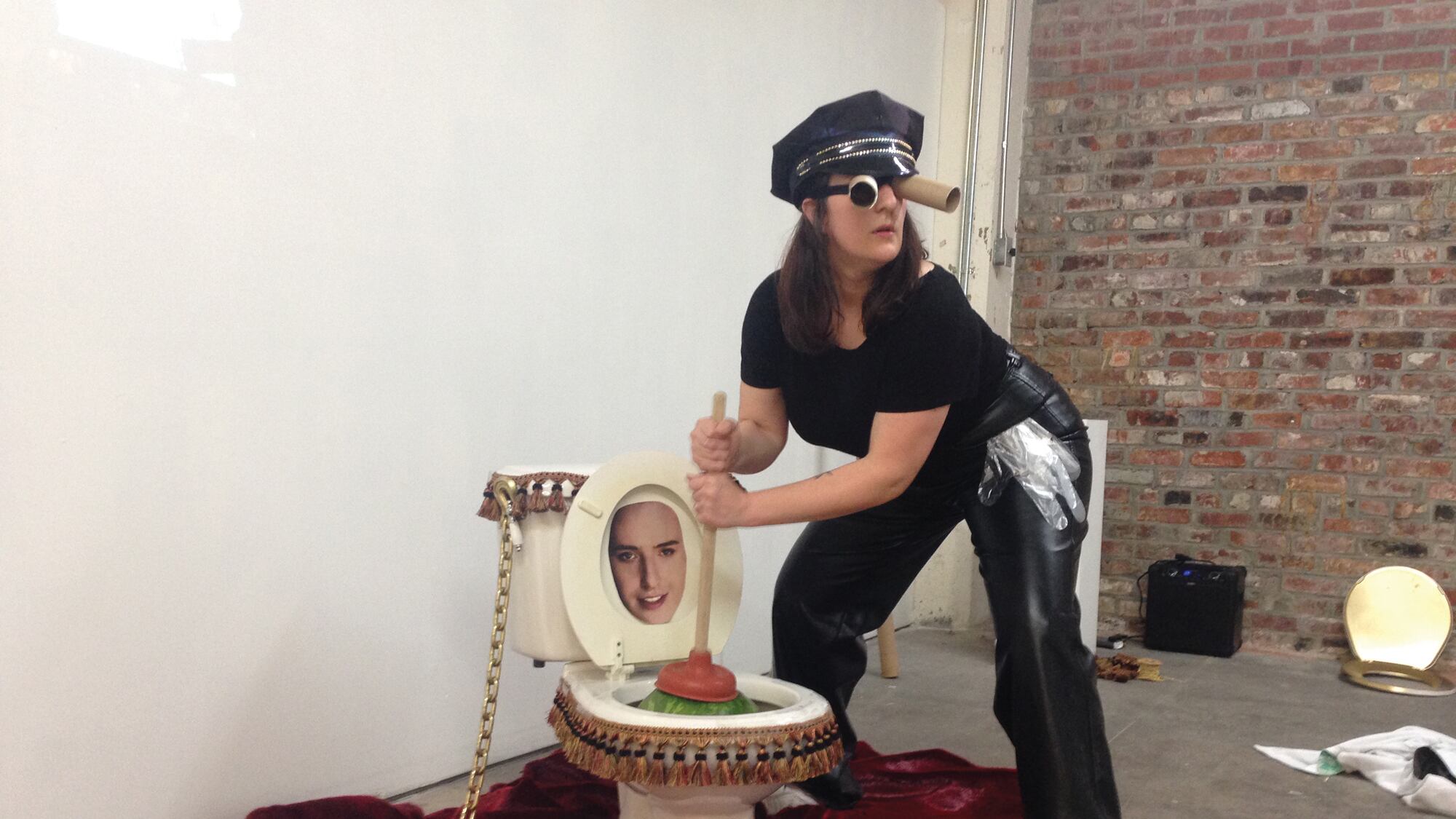In Killjoy Collective's basement gallery, artist Amy Chiao demonstrates the sound produced by plunging a watermelon.
"It makes like a kissing sound. You can also pick it up," says Chiao as she uses a plunger to lift a watermelon out of the toilet that will hold the fruit in her new show, A Melon Baby's Falsetto Sounds Better in the Bathroom.
Chiao's art installation and performance piece is partially about Vitas, a real-life Russian popera singer who has a large, rabid following in China. Vitas covers Russian and Chinese Communist anthems, and his songs are frequently covered by Chinese musicians. His falsetto can reach otherworldly heights—to Americans, he's best known for a viral video in which he wears futuristic Lycra and warbles his high-pitched voice like a turkey call. In Chiao's show, Vitas also inspires the production of weaponized watermelon babies.
The installation at Killjoy looks like a flamboyant bathroom more than a production facility. The two toilets, which double as watermelon baby incubators, are lined with fringe tassels and placed on synthetic red fur rugs. There's a pedestal for the plunger, and another for a toilet paper roll of red sequin fabric. For the performance piece, actor Emily June Newton plays the operator of the facility. She tends to the watermelons with a plunger while wearing leather pants and a captain's hat. In one scene, Newton straps a watermelon to the stomach of a leotard-wearing robot, played by Sascha Blocker. Then, she leads Blocker out of the facility with a bazooka built of toilet paper rolls pointed at her back. Meanwhile, a video of Vitas hugging a fainting audience member plays on a gallery wall. Devoid of dialogue and set to hyperspeed nightcore music, the 30-minute piece has a cartoonish quality that's somewhere between Benny Hill and the Mario Brothers.
Chiao gets that Melon Baby risks seeming like inscrutable strangeness. "I've always hated people calling my work 'weird,'" says Chiao, who graduated from the Rhode Island School of Design a few years ago. "Oftentimes, the word is used because someone doesn't want to understand what it is."
Melon Baby is basically an immersive, living collage of what Chiao sees as two compelling pieces of propaganda: Vitas and a poster from communist China that depicts a plump, smiling baby with his arms around a large watermelon. For Melon Baby, Chiao made bath towels printed with that image next to a photo of her father, who grew up during the Cultural Revolution, smiling and also cradling a watermelon. "To my dad, I was like, 'This is about propaganda,'" says Chiao about the towels. "He was like, 'You're thinking about it too much. I would call it Time Flies By.'" The photo was taken after Chiao's father immigrated to America and started a family. So to him, it depicted a happy ending.
Though the show has a menacing, militaristic undertone, we never see exactly how the melon babies are used as weapons, or what they're used against. "To me, it's just about the act of sacrifice for something that you don't know," says Chiao. "My parents were totally brainwashed. My dad, when he was young, he stole a grenade and hid it under his bed because he was like, 'Mao said we should fight.'"
It's rare that Communist propaganda is displayed to an American audience without the assumption that it will be considered menacing. But in Chiao's hands, the connotation of propaganda seems entirely fluid. In fact, everything in Melon Baby seems fluid. Toilet paper rolls are glued together to create a bazooka and an ammunition belt, or hold rolls of red sequin fabric that reference Vitas' signature red scarf. Blocker wears a helmet that's covered in rubber nipples, including one each in the center of two styrofoam balls. Chiao, who plays an Igor-like lab assistant, wears one strapped over her eye like a monocle. Every image the show uses—watermelons, bathrooms, Vitas—spirals outward until nothing is as it seems.
In a way, there's a parallel between how Chiao talks about propaganda and how she talks about people dismissing her art as "weird." Labeling something "bad" also means to hold it at arm's length.
"We only think other countries are using propaganda. But it's like our whole history education is propaganda," says Chiao. "It's about investigating, rather than being told something and not questioning."
SEE IT: A Melon Baby's Falsetto Sounds Better in the Bathroom is at Killjoy Collective, 222 SE 10th Ave., killjoypdx.com. 7 pm Friday, March 23, and 7:30 pm Saturday, March 31, or by appointment through April 14. Free.

